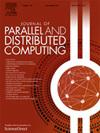A scheduler to foster data locality for GPU and out-of-core task-based linear algebra applications
IF 4
3区 计算机科学
Q1 COMPUTER SCIENCE, THEORY & METHODS
引用次数: 0
Abstract
Hardware accelerators like GPUs now provide a large part of the computational power used for scientific simulations. Despite their efficacy, GPUs possess limited memory and are connected to the main memory of the machine via a bandwidth limited bus. Scientific simulations often operate on very large data, that surpasses the GPU's memory capacity. Therefore, one has to turn to out-of-core computing: data is kept in a remote, slower memory (CPU memory), and moved back and forth from/to the device memory (GPU memory), a process also present for multicore CPUs with limited memory. In both cases, data movement quickly becomes a performance bottleneck. Task-based runtime schedulers have emerged as a convenient and efficient way to manage large applications on such heterogeneous platforms. We propose a scheduler for task-based runtimes that improves data locality for out-of-core linear algebra computations, to reduce data movement. We design a data-aware strategy for both task scheduling and data eviction from limited memories. We compare this scheduler to existing schedulers in runtime systems. Using StarPU, we show that our new scheduling strategy achieves comparable performance when memory is not a constraint, and significantly better performance when application input data exceeds memory, on both GPUs and CPU cores.
为GPU和核心外的基于任务的线性代数应用程序培育数据局部性的调度程序
像gpu这样的硬件加速器现在为科学模拟提供了很大一部分的计算能力。尽管它们的功效,gpu拥有有限的内存,并通过带宽有限的总线连接到机器的主存储器。科学模拟通常在非常大的数据上运行,这超过了GPU的内存容量。因此,必须转向核外计算:数据保存在远程、较慢的内存(CPU内存)中,并在设备内存(GPU内存)之间来回移动,这一过程也适用于内存有限的多核CPU。在这两种情况下,数据移动都会迅速成为性能瓶颈。基于任务的运行时调度器已经成为管理此类异构平台上的大型应用程序的一种方便而有效的方法。我们提出了一个基于任务的运行时调度器,它可以改善核心外线性代数计算的数据局部性,以减少数据移动。我们设计了一种数据感知策略,用于任务调度和从有限内存中提取数据。我们将此调度器与运行时系统中的现有调度器进行比较。通过使用StarPU,我们证明了我们的新调度策略在内存不受约束的情况下实现了相当的性能,并且在gpu和CPU内核上,当应用程序输入数据超过内存时显著提高了性能。
本文章由计算机程序翻译,如有差异,请以英文原文为准。
求助全文
约1分钟内获得全文
求助全文
来源期刊

Journal of Parallel and Distributed Computing
工程技术-计算机:理论方法
CiteScore
10.30
自引率
2.60%
发文量
172
审稿时长
12 months
期刊介绍:
This international journal is directed to researchers, engineers, educators, managers, programmers, and users of computers who have particular interests in parallel processing and/or distributed computing.
The Journal of Parallel and Distributed Computing publishes original research papers and timely review articles on the theory, design, evaluation, and use of parallel and/or distributed computing systems. The journal also features special issues on these topics; again covering the full range from the design to the use of our targeted systems.
 求助内容:
求助内容: 应助结果提醒方式:
应助结果提醒方式:


